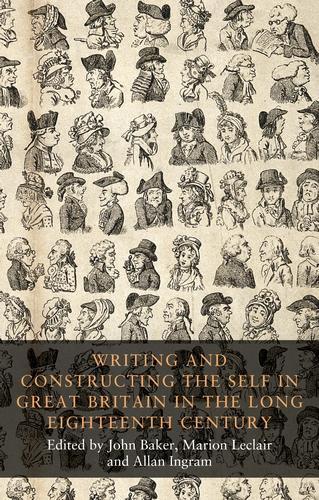
Writing and Constructing the Self in Great Britain in the Long Eighteenth Century
(Hardback)
Publishing Details
Writing and Constructing the Self in Great Britain in the Long Eighteenth Century
By (Author) John Baker
Edited by Marion Leclair
Edited by Allan Ingram
Manchester University Press
Manchester University Press
23rd October 2018
23rd October 2018
United Kingdom
Classifications
Physical Properties
Hardback
288
Width 138mm, Height 216mm
Description
The injunction, 'Know thyself!', resounding down the centuries, has never lost its appeal and urgency. The 'self' remains an abiding and universal concern, something at once intimate, indispensable and elusive; something we take for granted and yet remains difficult to pin down, describe or define. This volume of twelve essays explores how writers in different domains - philosophers and thinkers, novelists, poets, churchmen, political writers and others - construed, fashioned and expressed the self in written form in Great Britain in the course of the long eighteenth century from the Restoration to the period of the French Revolution. The essays are preceded by an introduction that seeks to frame several key aspects of the debate on the self in a succinct and open-minded spirit. The volume foregrounds the coming into being of a recognisably modern self. -- .
Reviews
'The easy-to-follow structure of the volume gives readers the idea of the progress of thoughts in their continuity and helps understand both congruous and controversial ideas. The selection of authors and thinkers represents a kaleidoscope of the self as perceived by contemporaries and reread by twenty-first-century scholars. Writing and Constructing the Self is a must-read for academics and university students who are concerned with the philosophical, literary, historical aspects of selfhoodalong with the related notions of self-awareness, subjectivity, the first-person perspective in narratives, self-articulation, and individuality.'
Hungarian Journal of English and American Studies (26.1)
'Writing and Constructing the Self contributes an important critical framework and serves as a touchstone for other such focused studies of the eighteenth-century self, and selves. Scholars interested in tracing the influence of Lockes Essay and/or teaching the self to undergraduate or graduate students would find this
book valuable, due to its division into parts and chapters that serve as discussion starters. The books foregrounding of women such as Haywood and Madame de La Fayette and their characters, alongside male-penned female selves, renders it an important contribution to feminist literary/cultural studies.'
ABO
Author Bio
John Baker is Senior Lecturer in English at Panthon-Sorbonne University Paris 1
Marion Leclair is a doctoral student at Sorbonne Nouvelle University Paris 3 and a research and teaching assistant at the Universit de Cergy-Pontoise
Allan Ingram is Emeritus Professor of English at the University of Northumbria at Newcastle
